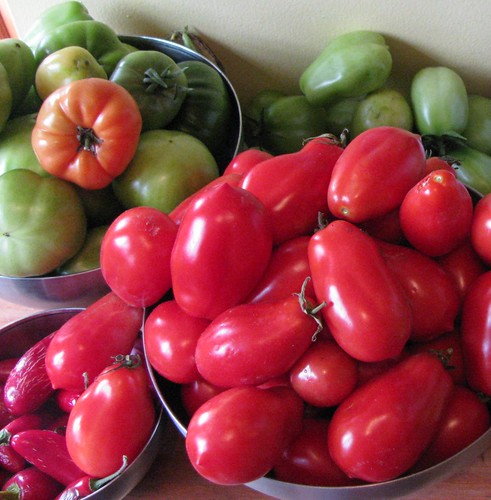 "We live in an amazing country where it's perfectly legal to feed your kids twinkies, hoho cakes, and mountain dew, but raw milk, that's dangerous." So began Joel Salatin's Saturday keynote address to the Ohio Ecological Food and Farming Association annual conference on February 13, 2010. I attended the talk. The writing below is my best effort to impartially summarize Salatin's opinions as he shared them.
Joel Salatin is the farmer behind Polyface Farms, a revolutionary pasture based meat producing business. Polyface Farms was featured in Michael Pollan's recent Omnivore's Dilemma and the movie Food Inc.
"We live in an amazing country where it's perfectly legal to feed your kids twinkies, hoho cakes, and mountain dew, but raw milk, that's dangerous." So began Joel Salatin's Saturday keynote address to the Ohio Ecological Food and Farming Association annual conference on February 13, 2010. I attended the talk. The writing below is my best effort to impartially summarize Salatin's opinions as he shared them.
Joel Salatin is the farmer behind Polyface Farms, a revolutionary pasture based meat producing business. Polyface Farms was featured in Michael Pollan's recent Omnivore's Dilemma and the movie Food Inc.
Mr. Salatin shared a litany of things he wants to do that are illegal (in his home state of Virginia, rules are not necessarily the same in every state):
- Hire local kids to do farm work - power tools are legally too dangerous, yet they can be licensed to drive cars
- Make lard and can stews - legally must be made in a commercial kitchen which can't be in an agricultural zone
- Cure meats - laws require these must be done in a separate outbuilding, one not in an agricultural zone
- Give tours or build a cabin for visitors - charging for these services would be entertainment, and entertainment is not allowed in an agricultural zone (Mr. Salatin joked, "This is farmland and it's not to be for entertainment. Nothing is funny on a farm.")
Salatin was serious when he called on the audience to be realistic about the fight for real food production. He offered anecdotal evidence that the average citizen hasn't heard of Food Inc. and regularly eats fast food without thought to the ingredient quality. He declared, "if our position succeeds, it will completely invert the power, prestige, and position of food lords."
Mr. Salatin explained which current paradigms must shift to have a real food system.
First, the current paradigm is that the government is more trustworthy than individuals. Salatin, with much experience advocating for sustainable farming at the local and national level, believes the "very notion that a bureaucrat is more honest than a farmer is repugnant."
Secondly, current decision makers and food laws imply that food safety is objective. Salatin believes it is not. He pointed out that hunting is a proud time honored tradition that exists outside of food safety codes and is deemed 'safe' by thousands of citizens who eat venison every year. Food safety regulations mostly come into play when food is exchanged for commerce. He questioned, "You can give away raw milk or cheese. What is it about exchanging money that makes it a hazardous substance?"
Next, the current paradigm is that bugs are bad. Americans, especially, have an obsession with sterility that destroys the good bugs who could eat the bad bugs. It is creating immune system dysfunction on an epidemic scale. In real food circles, kefir, kim chee, kombucha and other 'good bug' fermented foods are making a come back.
In general, people are ignorant and trained to feel that freedom of choice is scary. Salatin reminded the audience of the origin of the USDA meat stamp of approval. In 1906 after the Jungle was published, meat purchased dropped by 50%. Farmers lobbied congress and Roosevelt created the stamp of approval to increase credibility among consumers. So is the way with many labels; the average consumers' fear leads to certifications that are little more than hoop-jumping red tape for small producers.
Finally, the processed food system is so pervasive that people now believe it is normal. In reality, Salatin believes, it is not normal for most societies past to present to eat food you can't pronounce. It is not normal to eat food you can't make in your kitchen. As a measure of real food, Salatin proposes don't "eat any food that wasn't available before 1900."

Salatin's speech ended with several empowering alternatives for those looking to produce and consume traditional whole foods.
1) Don't comply. Salatin suggested opting out of the industrial food system. Find your own kitchen. Buy directly from the farmer and talk to them about where and how their goods were raised. "Take your TV up to a high hill with a deer riffle," he said, advocating that people avoid the traditional media focus on the quick, easy, and cheap.
2) Create a non-commerce system. Community Supported Agriculture arrangements have passed the regulations test and allow farmers to offer a variety of products. Creating private clubs and herd share programs are other non commerce alternatives. Some farmers have even had success giving their product away and make their money through donation bucket collections.
3) Look for loopholes and renaming opportunities. Read regulations carefully and follow them literally. Salatin gave the example of a farmer who needed to follow a regulation that required a wall with a window in one of his buildings. Size was not mentioned, so he built a dog house sized wall and window in the shelter. A raw milk producer relabeled her milk as 'pet food' and is able to sell it without concern about anti-raw regulations. Another sells her artisanal cheese as 'fish bait' because there are no regulations regarding fish bait in her area.
Salatin concluded his talk demanding "we need a constitutional amendment guaranteeing every American the freedom of food choice. This heritage, sacred, noble food production system will not be wiped from our culture."
You can read more about Salatin in his many books including Everything I Want To Do Is Illegal: War Stories From the Local Food Front
 Ah, it feels good to be back together. This weekend was bustling with foodie tasks: Alex stuffed cured pork chunks into beef middles and hung them to dry for coppa, Rachel rinsed and readied pork belly for bacon makin', the whole family helped friends kill and eat a backyard chicken, and we made Lean Green Bean's homemade soft pretzels and beer cheese sauce for a Superbowl dinner.
Ah, it feels good to be back together. This weekend was bustling with foodie tasks: Alex stuffed cured pork chunks into beef middles and hung them to dry for coppa, Rachel rinsed and readied pork belly for bacon makin', the whole family helped friends kill and eat a backyard chicken, and we made Lean Green Bean's homemade soft pretzels and beer cheese sauce for a Superbowl dinner.





